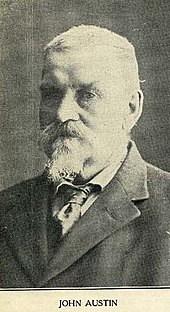John Austin (legal philosopher)
John Austin (born March 3, 1790 in Creeting Mill , Suffolk , England , † December 1, 1859 in Weybridge , Surrey ) was an English lawyer and legal philosopher .
Life
Austin gained groundbreaking influence on the legal debate with his publication The Province of Jurisprudence Determined (1832) after his death by establishing a right- wing positivist position. Austin defended the separation between positive law and morality .
The main lines of Austin's theory are: There are two kinds of rules of conduct, namely those imposed by God, which are based on opinion, and those imposed by humans, which are based on positing. The rules imposed by God belong to natural law because, contrary to the rules imposed by humans, they were set without a political authority. This gives rise to positive morality. Positive law is established by a person and a political authority.
A rule of law consists of a general order and the threat of a sanction , provided that the issuer of the order has the power to impose the sanction. This creates an obligation for the addressees of the command. Law itself is the sum of the orders which emanate from the highest social authority, the sovereign and which the mass of society habitually obeys. As a utilitarian , Austin believed that established positive rights should improve society as much as possible.
John Austin was married to the writer and translator Sarah Austin . She published his lectures posthumously .
literature
- The small encyclopedia , Encyclios-Verlag, Zurich, 1950, volume 1, page 109
Web links
- Literature by and about John Austin in the catalog of the German National Library
- Articles in the encyclopedia Stanford University (English)
| personal data | |
|---|---|
| SURNAME | Austin, John |
| BRIEF DESCRIPTION | English lawyer and legal philosopher |
| DATE OF BIRTH | March 3, 1790 |
| PLACE OF BIRTH | Creeting Mill , Suffolk, England |
| DATE OF DEATH | December 1, 1859 |
| Place of death | Weybridge , Surrey |
